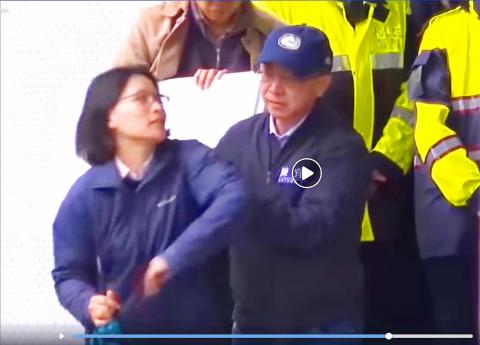The Democratic Progressive Party (DPP) yesterday released a video that appears to show a Chinese Nationalist Party (KMT) legislator pushing a policewoman at a protest in Taipei the previous day.
A group of 10 to 20 KMT lawmakers and some city councilors on Friday tried to enter the Ministry of Foreign Affairs building to demand that Minister of Foreign Affairs Joseph Wu (吳釗燮) offer an explanation for the suicide last year of Su Chii-cherng (蘇啟誠), the then-director-general of the Osaka branch of the Taipei Economic and Cultural Office in Japan.
However, police at the main entrance blocked the KMT members and a scuffle ensued.

Photo: Screen grab from Deputy Legislative Speaker Tsai Chi-chang’s Facebook account
The footage, shared by DPP Legislator Wang Ting-yu (王定宇), appears to show KMT Legislator Arthur Chen (陳宜民) asking the policewoman what her unit is and knocking her cap off before pushing her.
KMT legislators William Tseng (曾銘宗) and Lin Te-fu (林德福) appear to physically intimidate a junior official from the ministry’s press room and repeatedly ask him whether he is a National Security Bureau agent.
The video appeares to show another ministry official being confronted by Taipei City Councilor William Hsu (徐弘庭) and New Taipei City Councilor Lin Chin-chieh (林金結).
KMT legislators Lin Yi-hua (林奕華) and Chen Yu-jen (陳玉珍) were caught in the altercation for more than an hour, during which Chen Yu-jen fainted and Lin Yi-hua sustained serious bruises, the KMT said, adding that the two sought medical treatment at National Taiwan University Hospital.
The National Police Agency’s Special Police Sixth Corps on Friday said it would bring charges against Arthur Chen for obstruction of official duty, adding that the officer is a member of the corps.
Arthur Chen later that night said on Facebook that he was “caught up in the moment” and called on the officer to provide video evidence of the altercation.
The KMT said its lawmakers wanted the ministry to show accountability over Su’s death after Yang Hui-ju (楊蕙如), a former campaign aide to Representative to Japan Frank Hsieh (謝長廷), was on Tuesday indicted for hiring people to influence public opinion online and attack or deride opponents.
Yang allegedly directed an online campaign to defend Hsieh by accusing Su of dereliction of duty and failing to help Taiwanese stuck at Japan’s Kansai Airport when Typhoon Jebi hit the country on Sept. 4 last year.
The accusations stemmed from a fabricated news story that the Chinese embassy in Japan sent buses to evacuate Chinese stranded at the airport.
Although the report was later proven to be false, it sparked criticism of perceived inaction by the ministry to help Taiwanese stranded at the airport.
The hired Internet users allegedly called Su and other branch personnel “festering remnants of the party-state ruled by the KMT,” and wished death upon them, which some said might have contributed to Su committing suicide at his residence in Osaka eight days later.

SECURITY: As China is ‘reshaping’ Hong Kong’s population, Taiwan must raise the eligibility threshold for applications from Hong Kongers, Chiu Chui-cheng said When Hong Kong and Macau citizens apply for residency in Taiwan, it would be under a new category that includes a “national security observation period,” Mainland Affairs Council (MAC) Minister Chiu Chui-cheng (邱垂正) said yesterday. President William Lai (賴清德) on March 13 announced 17 strategies to counter China’s aggression toward Taiwan, including incorporating national security considerations into the review process for residency applications from Hong Kong and Macau citizens. The situation in Hong Kong is constantly changing, Chiu said to media yesterday on the sidelines of the Taipei Technology Run hosted by the Taipei Neihu Technology Park Development Association. With

CARROT AND STICK: While unrelenting in its military threats, China attracted nearly 40,000 Taiwanese to over 400 business events last year Nearly 40,000 Taiwanese last year joined industry events in China, such as conferences and trade fairs, supported by the Chinese government, a study showed yesterday, as Beijing ramps up a charm offensive toward Taipei alongside military pressure. China has long taken a carrot-and-stick approach to Taiwan, threatening it with the prospect of military action while reaching out to those it believes are amenable to Beijing’s point of view. Taiwanese security officials are wary of what they see as Beijing’s influence campaigns to sway public opinion after Taipei and Beijing gradually resumed travel links halted by the COVID-19 pandemic, but the scale of

A US Marine Corps regiment equipped with Naval Strike Missiles (NSM) is set to participate in the upcoming Balikatan 25 exercise in the Luzon Strait, marking the system’s first-ever deployment in the Philippines. US and Philippine officials have separately confirmed that the Navy Marine Expeditionary Ship Interdiction System (NMESIS) — the mobile launch platform for the Naval Strike Missile — would take part in the joint exercise. The missiles are being deployed to “a strategic first island chain chokepoint” in the waters between Taiwan proper and the Philippines, US-based Naval News reported. “The Luzon Strait and Bashi Channel represent a critical access

Pope Francis is be laid to rest on Saturday after lying in state for three days in St Peter’s Basilica, where the faithful are expected to flock to pay their respects to history’s first Latin American pontiff. The cardinals met yesterday in the Vatican’s synod hall to chart the next steps before a conclave begins to choose Francis’ successor, as condolences poured in from around the world. According to current norms, the conclave must begin between May 5 and 10. The cardinals set the funeral for Saturday at 10am in St Peter’s Square, to be celebrated by the dean of the College